Direct Link:
https://www.captechu.edu/node/2881
Since coming to Capitol in 2000, Dr. Helen G. Barker has served the
university in many capacities: first as an adjunct professor, then as a
member of the full-time faculty, and subsequently as academic dean.
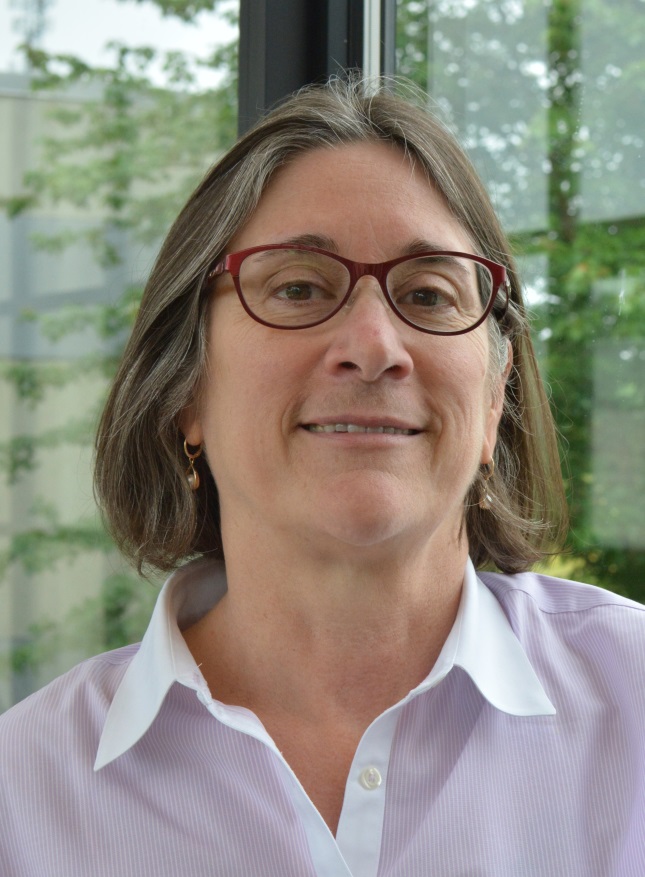
She
has helped countless students at the graduate and undergraduate levels,
mentored faculty, and spearheaded new programs. Now, as Capitol enters
an era of new presidential leadership and expansion, Dr. Barker brings
her experience and vision to a pivotal role at the university: that of
chief academic officer (CAO).
Dr. Barker became CAO in the fall of
2017 and will chart a course forward as Capitol launches multiple new
programs, including a PhD in technology, a master’s program in cyber
analytics, as well as undergraduate and graduate programs in business
analytics.
In the following interview, Dr. Barker highlights her
priorities as CAO and also discusses some of the characteristics that
distinguish Capitol from other colleges and universities.
What are your primary goals as CAO? What do you most want to accomplish?
I
aim to foster a culture of growth at the university – a culture that
thinks not only about where we are now, but where we can be, and what we
can conceivably do. How can we make what we do even better and more
exciting?
It’s not a top-down agenda; it’s an everybody agenda.
We’re looking for creativity and innovation to spread throughout the
institution. We’re a team in this journey that will shape what Capitol
becomes in the future.
What perspectives do you bring with you as someone who has been a faculty member?
I
bring the perspective of someone who understands faculty concerns, and
also the perspective of someone who has worked closely with students for
many years. I have an up-close understanding of the teaching and
learning environment that our faculty delivers to students.
As
CAO, my role involves finding the right balance between different sets
of concerns. There are many great ideas out there for programs, classes,
or resources, but not all these ideas align with the Capitol mission.
And not all of them are viable from a budgetary standpoint. As an
administrator, it’s part of my job not only to make these calls, but to
convey to other stakeholders in the university the reasons for making
them – the parameters we are working within. Because I’ve been a faculty
member and a dean, I feel I’m in a good position to foster a productive
dialogue among students, faculty, and administration.
While a faculty member, what are some essential things that you learned about how to deliver educational value to students?
Number
one is to understand that you can and should learn from the students.
The classroom is a two-way experience. No matter how bright we think we
are as faculty, no matter how much we know, there’s always something to
learn. That can mean, for instance, learning new ways of teaching that
are effective with a younger generation of students – the millennials.
It can mean learning how to better serve students who have a
disability. My experience is that students have greater respect for
teachers who understand that education is a two-way process.
I
also think it’s essential to stick your neck out on behalf of your
students – experiment, modify your game plan as needed, and resist the
temptation to stay in your comfort zone. That could mean, for instance,
collaborating with faculty in other disciplines to create a hybrid
course, like Dr. Sandy Antunes of the astronautical engineering
department has done together with cybersecurity professor Rick Hansen.
It can mean taking on a mentoring role for students, as Dr. Garima Bajwa
did when she assisted one of our students, Zalika Dixon, in developing a
project that eventually went to the Grace Hopper Celebration and won a
research award.
Our new president, Dr. Sims, has shown a
commitment to encouraging out-of-the-box thinking – and that’s an
opportunity we should all be excited about. We
all have an opportunity to take Capitol to the next version of who we are.
Higher
education is often said to be going through a period of considerable
flux, as schools re-evaluate what their mission is and how best to meet
the needs of a rapidly changing economy. What do you see as the major
challenges?
It’s crucial to stay on top of what the
market is looking for, while continuing to adhere to the highest
educational standards and the requirements for accreditation. Students
need the fundamentals as well as specialized academic skills. It can
sometimes be a delicate balance. A given program has a prescribed number
of credits. Students pay tuition for all of these credits. We don’t
want students racking up massive debts paying for courses that aren’t
relevant to their educational and career tracks. At the same time, we
don’t want students graduating without a solid, well-rounded education
that includes critical thinking and the liberal arts.
For a small,
independent university like Capitol, budgets are always a challenge.
At the same time, tight budgets can fuel creative thinking and wise
decision-making. Capitol has thrived over the years because we’ve made
good choices. Small size is also an asset in that it makes us more
agile; we can respond more quickly.
What are some things about Capitol that inspire you, that make you feel excited to be here?
This
is a close-knit, caring community. Not long ago, a member of our
adjunct faculty became ill while teaching requiring emergency care. She
told us later that she realized that day how genuinely concerned we all
are here about each other’s well-being. It’s the Capitol culture. We’ve
created an environment of caring, dedicated, hard-working people who
think in terms of what’s good for the school, for the students, and for
each other as members of the university community. I appreciate working
in this type of environment.

 “There’s
only so much I can do as a middle person to communicate the abilities
of a student,” says Alspaw. “This career fair will be an excellent
opportunity for students to build up their professional network.”
“There’s
only so much I can do as a middle person to communicate the abilities
of a student,” says Alspaw. “This career fair will be an excellent
opportunity for students to build up their professional network.”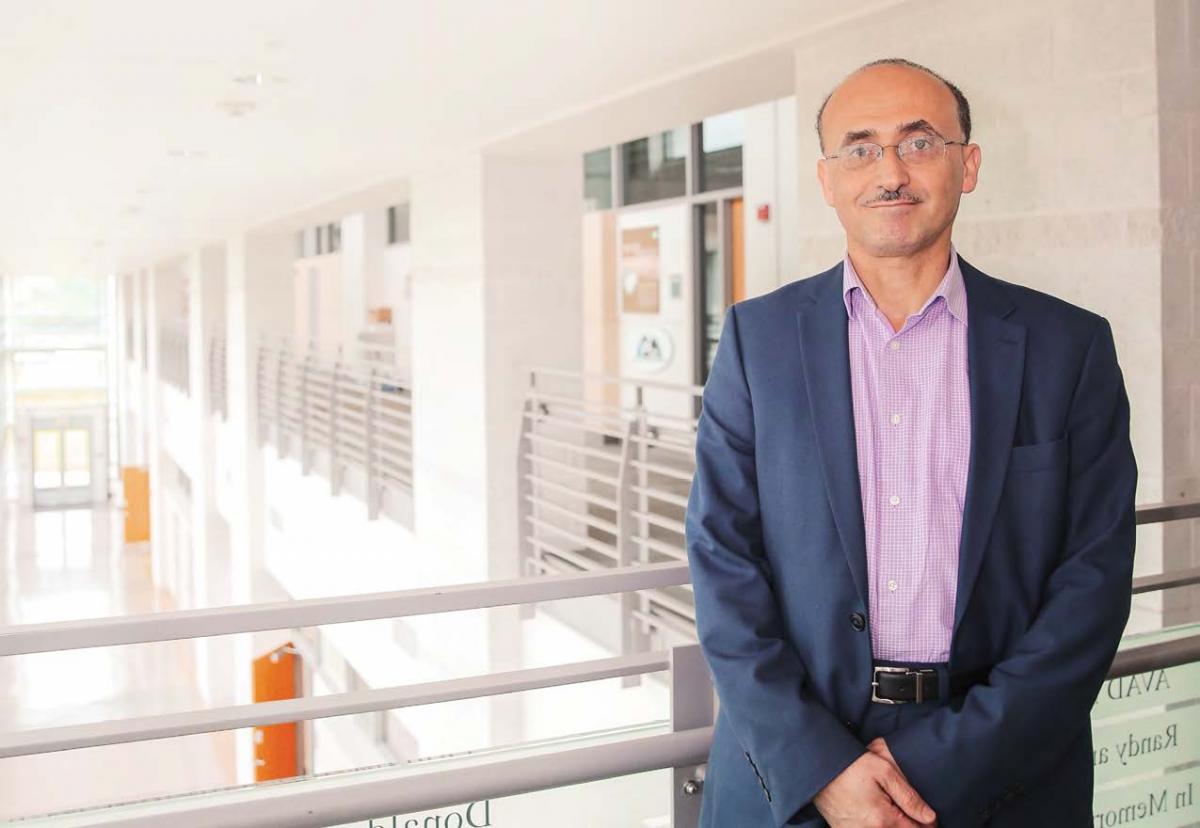
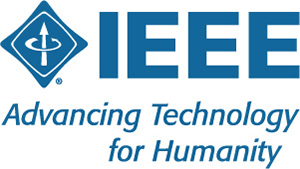 “We
see a need for network engineers to boost their programming skills
because of this trend, Abu-Ageel said. “Software is replacing various
hardware functions, so it’s important for network engineers to
understand the software and how it works.”
“We
see a need for network engineers to boost their programming skills
because of this trend, Abu-Ageel said. “Software is replacing various
hardware functions, so it’s important for network engineers to
understand the software and how it works.”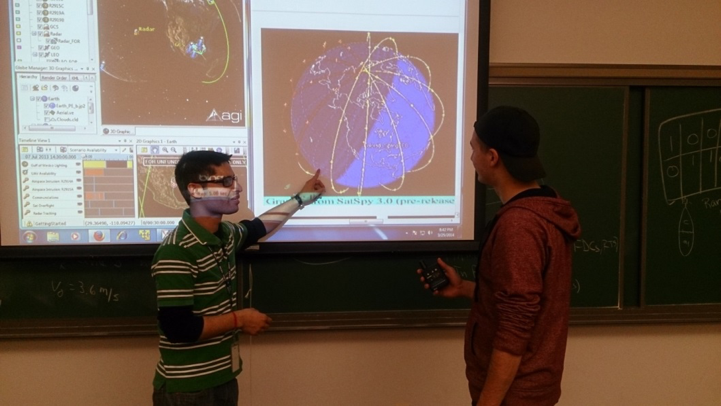
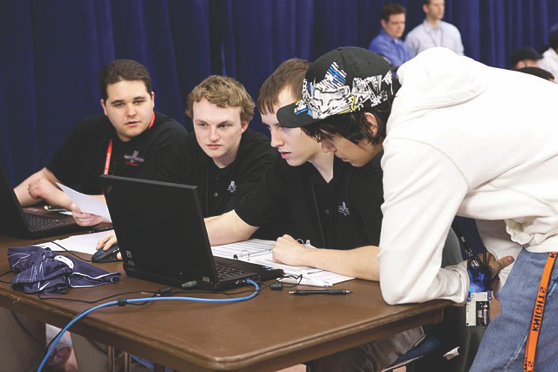
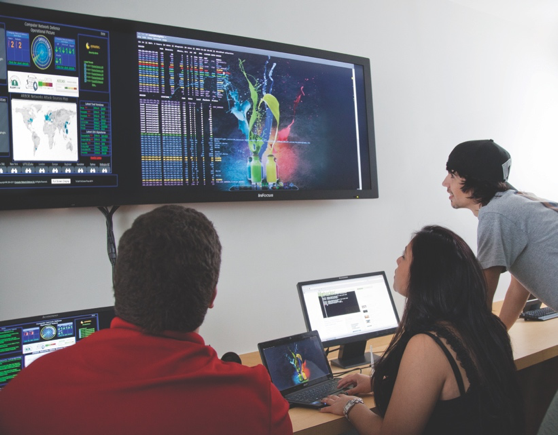 Aspiring cyber warriors at Capitol not only have the benefit of attending a highly ranked cybersecurity program –
Aspiring cyber warriors at Capitol not only have the benefit of attending a highly ranked cybersecurity program –  The US Army drove that point home on Wednesday (December 13) when it announced
The US Army drove that point home on Wednesday (December 13) when it announced 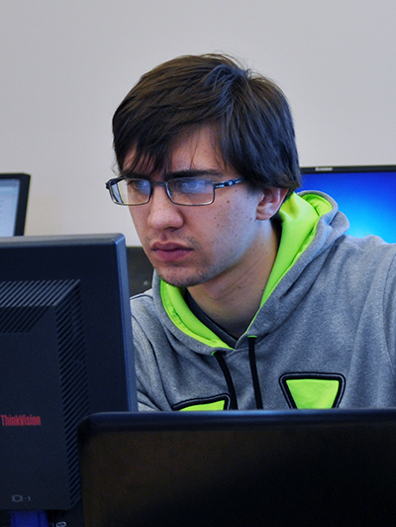 They
also become familiar with the terminology used by cybersecurity
professionals in the field. Are you interested in studying to become a
“white hat hacker” and use your skills to conduct authorized exploits
against networks and systems? As a cybersecurity student you’ll find out
how. And you’ll also become conversant with the terms below.
They
also become familiar with the terminology used by cybersecurity
professionals in the field. Are you interested in studying to become a
“white hat hacker” and use your skills to conduct authorized exploits
against networks and systems? As a cybersecurity student you’ll find out
how. And you’ll also become conversant with the terms below. The
reward for sound decision-making is improved market share. The
punishment for unwise decisions, in today’s economy, can be ruthless.
That’s why organizations in an ever-expanding array of industries – from
sports to health care to cybersecurity – are seeking out professionals
with the expertise needed to utilize data effectively.
The
reward for sound decision-making is improved market share. The
punishment for unwise decisions, in today’s economy, can be ruthless.
That’s why organizations in an ever-expanding array of industries – from
sports to health care to cybersecurity – are seeking out professionals
with the expertise needed to utilize data effectively. The
US Bureau of Labor Statistics predicts faster-than-average, 12% growth
for management analysts between 2016 and 2026. For data scientists, the
demand is astonishingly robust, with job postings increasing by 361%
between 2013 and 2016, according to EAB. Data analysts, meanwhile, saw
an 83% growth in opportunities during the same period.
The
US Bureau of Labor Statistics predicts faster-than-average, 12% growth
for management analysts between 2016 and 2026. For data scientists, the
demand is astonishingly robust, with job postings increasing by 361%
between 2013 and 2016, according to EAB. Data analysts, meanwhile, saw
an 83% growth in opportunities during the same period.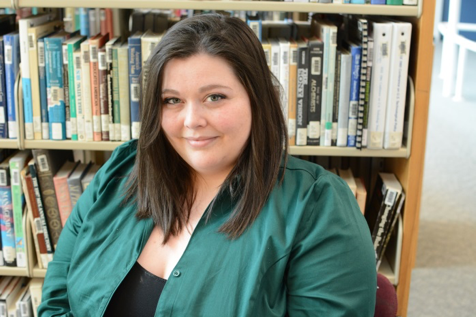 “It represents, for the federal government, a way of determining that you can be trusted,” notes
“It represents, for the federal government, a way of determining that you can be trusted,” notes  She
has helped countless students at the graduate and undergraduate levels,
mentored faculty, and spearheaded new programs. Now, as Capitol enters
an era of new presidential leadership and expansion, Dr. Barker brings
her experience and vision to a pivotal role at the university: that of
chief academic officer (CAO).
She
has helped countless students at the graduate and undergraduate levels,
mentored faculty, and spearheaded new programs. Now, as Capitol enters
an era of new presidential leadership and expansion, Dr. Barker brings
her experience and vision to a pivotal role at the university: that of
chief academic officer (CAO).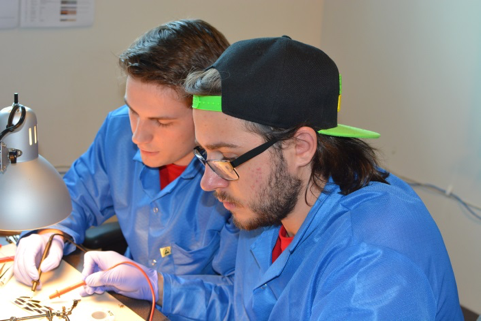 Lead engineer Pierce Smith, a senior, can be found most afternoons in the clean room of Capitol’s
Lead engineer Pierce Smith, a senior, can be found most afternoons in the clean room of Capitol’s 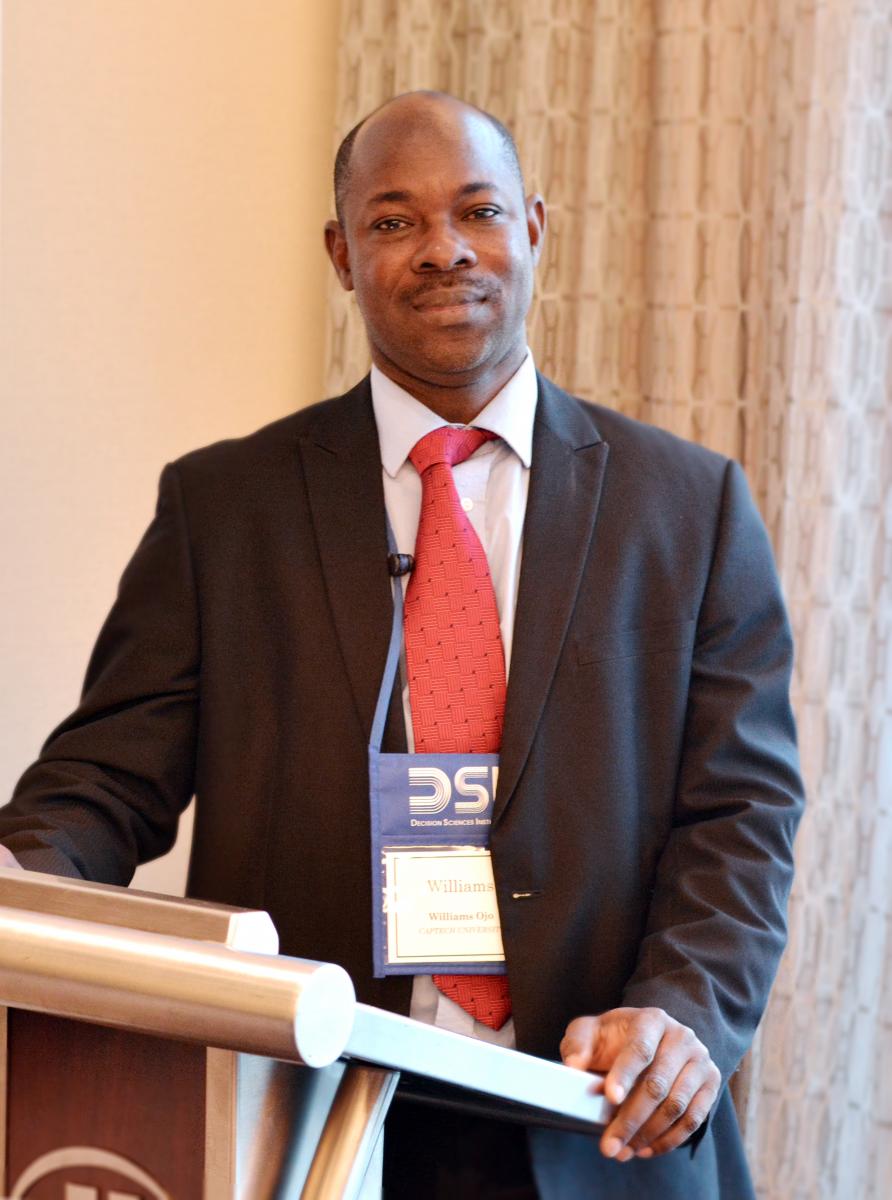 “There
was a gap in terms of trying to identify precisely the number of people
affected and the number of nurses and doctors that needed to be
deployed in specific areas,” recalls Ojo, who served as an World Health
Organization (WHO) information systems management officer in the wake of
the disaster. “I observed that some locations had more doctors and
nurses than needed, while others did not have enough. This was because
of the lack of an integrated database.”
“There
was a gap in terms of trying to identify precisely the number of people
affected and the number of nurses and doctors that needed to be
deployed in specific areas,” recalls Ojo, who served as an World Health
Organization (WHO) information systems management officer in the wake of
the disaster. “I observed that some locations had more doctors and
nurses than needed, while others did not have enough. This was because
of the lack of an integrated database.”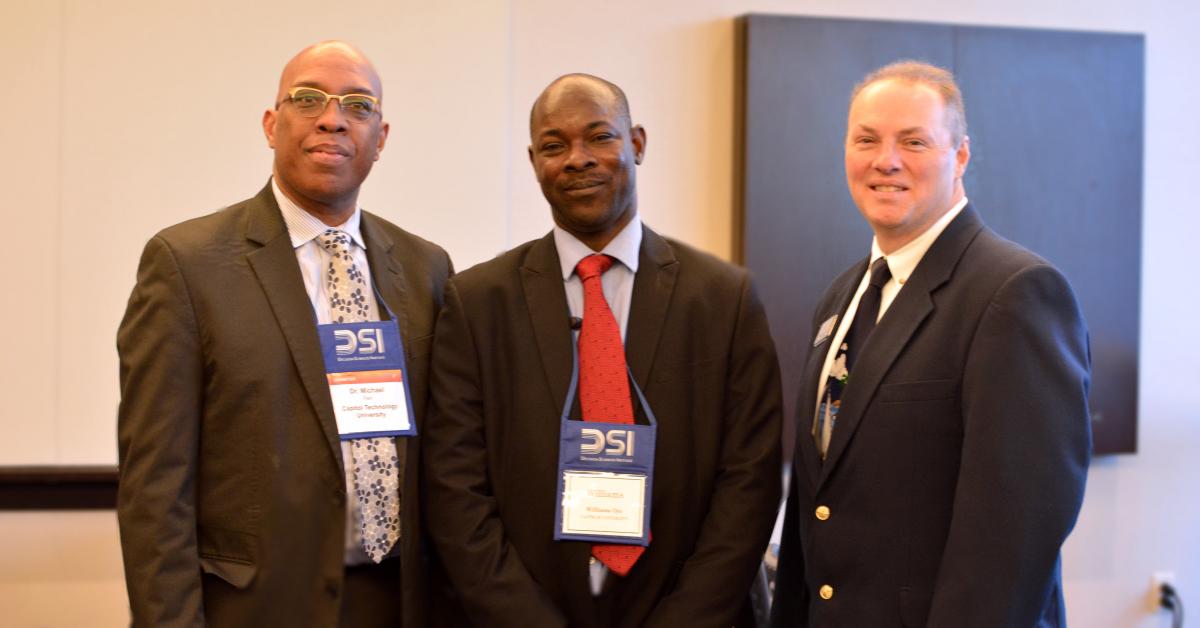 “If
we have baseline data regarding the population, number of health
facilities, and human resources in a given area, then we can use
modelling to determine the appropriate number of doctors, nurses,
sanitation workers, and other personnel that need to be sent to that
area during an emergency,” Ojo said.
“If
we have baseline data regarding the population, number of health
facilities, and human resources in a given area, then we can use
modelling to determine the appropriate number of doctors, nurses,
sanitation workers, and other personnel that need to be sent to that
area during an emergency,” Ojo said.